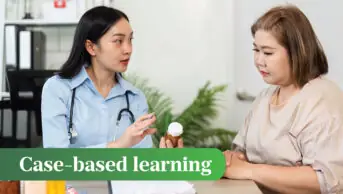
Carol and Mike Werner / Alamy Stock Photo
In June 2017, The Guardian published data obtained under a Freedom of Information request to NHS England. It showed an increase in the number of children and young people being prescribed antidepressants for anxiety or depression[1]
.
The data revealed a 12% increase in the number of young people aged under 18 years being given antidepressants between April 2015 and June 2016. In total, 166,000 children and young people under 18 years were given antidepressants during this time. This figure included more than 11,000 children aged 12 years or under, and 537 children aged six years or under.
This increase in antidepressant use for children and young people reflects a more general trend. The total number of antidepressants prescribed and dispensed outside of hospitals for all ages doubled between 2005 and 2015[2]
. Antidepressants were also found to be the area with the largest increase in prescriptions during 2016, according to figures from NHS Digital[3]
.
The increase in prescriptions of antidepressants for children and young people is especially important to consider within the wider context of child and adolescent mental health services (CAMHS) facing rising referrals and ongoing challenges in accessing those services for young people struggling with their mental health.
Overwhelmed NHS mental health services
It is not news that NHS mental health services are overwhelmed and have been chronically underfunded. Indeed, last year, health secretary Jeremy Hunt said: “CAMHS is possibly the biggest single area of weakness in NHS provision at the moment”[4]
. This has resulted in long waiting times between referral, assessment and treatment for young people who seek out these services. A 2016 report by the Education Policy Institute, based in London, demonstrated that the average maximum waiting times for all CAMHS providers was six months for a first appointment and nearly ten months for the start of treatment[5]
.
Similarly, there have been reports of increasingly high thresholds for access to specialist services. A recent investigation by the GPs’ newspaper Pulse found that three in five referrals from GPs to CAMHS are being ‘batted back’ to primary care without access to specialist support[6]
.
Sadly, these reports reflect what we hear from our parent helpline at YoungMinds, which receives many calls from parents of children and young people who are trying to get support but having to battle long waiting times or being turned away because of rising thresholds.
In light of this situation, mental health experts are becoming concerned that primary care professionals may be using antidepressants as a sticking plaster for children and young people in the absence of a wider package of psychological treatments[7]
.
Children and young people who are struggling with their mental health but unable to access specialist mental health services and their families are in difficult situations and will need some form of support.
We hear from many families that antidepressants can have a positive impact for some young people, allowing them to regain quality of life and engage in other therapies. And especially for some young people with more severe mental health conditions, parents have described antidepressants as playing a huge role in their recovery. However, for others, an alternative to medication is better.
There have been several recent studies that have raised concerns about the suitability of antidepressants for children and young people
There have also been several recent studies that have raised concerns about the suitability of antidepressants for children and young people. Last year, a systemic review of all clinical trials into the effects of antidepressants on children and young people found that only one of 14 drugs was better than a placebo at relieving the symptoms of young people with major depression, while raising concerns that some of the drugs may actually be harmful[8]
.
Similarly, the findings from clinical trials published in the BMJ in 2016 showed that, when using some of the most common antidepressants, the risk of suicidality and aggression doubled for children and adolescents[9]
.
The National Institute for Health and Care Excellence (NICE) guidance states that antidepressants should be given only to teenagers and children with moderate or severe depression, when psychotherapy has failed. It also advises that such medicines should be taken in concert with other support, such as counselling[10]
.
If antidepressants are being prescribed as temporary support for children and young people with mental health problems and their families, it is crucial that a long-term solution to these problems is sought out and that talking therapies and psychological treatments are made readily available to young people and families in need of support as part of a package of care.
Experts are becoming concerned that primary care professionals may be using antidepressants as a sticking plaster for children and young people in the absence of a wider package of psychological treatments
Access to reliable information
We often hear from children and young people, and their parents or carers, that they want to be involved in decisions about medication and need to understand the implications of it.
It is vital that children and parents have comprehensive information about side effects. This can be hard to access, and families may feel under pressure to use medication if it is the only support offered but may not fully understand its side effects. In 2014, YoungMinds conducted a survey which found that half of young people taking medication were unhappy with the information they had received about the side effects[11]
.
To fill this gap, YoungMinds launched the HeadMeds website in 2014, which aims to provide comprehensive, reliable and up-to-date information and real-life stories about a range of mental health medicines prescribed for children and young people. Pharmacists who come across prescriptions for mental health medicines for young people should signpost them to resources such as this.
To enable children, young people and their families to make the decision which is best for their mental health, it is crucial that GPs and primary care professionals provide them with reliable information about the benefits and side effects of drugs. However, there have been reports that GPs feel as though they are acting beyond their capacity and competence when it comes to children and young people’s mental health[12]
.
There is a strong argument for providing increased training for GPs and other professionals, including pharmacists, relating specifically to children and young people’s mental health. What is most important though is ensuring that children and young people are able to access a choice of evidence-based treatments and that those with emerging mental health problems receive access to early-intervention support.
Early intervention and more funding
The last national prevalence survey, carried out in 2004, found that only one in four children and young people with a diagnosable mental health condition receive the treatment and care that they need[13]
.
The government is providing £1.4bn of additional investment into children and young people’s mental health services to implement the agenda of the ‘Future in mind’ report and the ‘Five year forward view for mental health’, and to ensure that an additional 70,000 children and young people receive mental health care each year by 2020–2021[14]
[15]
. We welcome this direction of travel, in particular the focus on prevention and early intervention. However, there is a long way to go.
Even to achieve the target of increasing access to an additional 70, 000 children and young people by 2020–2021 would still leave two in three children and young people with a diagnosable mental health condition who will not receive the treatment and care they need.
At least half of clinical commissioning groups were not spending all the additional investment on young people’s mental health services but, instead, were using some of that money to backfill cuts
Further to this, a worrying Freedom of Information request carried out by YoungMinds in 2016 found that at least half of clinical commissioning groups were not spending all of the additional investment on children and young people’s mental health services but, instead, were using some of that money to backfill cuts or to provide for other priorities[16]
. And we see this picture against a backdrop of reducing local authority budgets for CAMHS leading to cuts for essential early-intervention services.
The government must ensure that there is investment in early intervention services to prevent children and young people’s mental health problems escalating during long waits for help after problems first emerge.
Finally, the education system also has a role to play in helping young people to build resilience, promote wellbeing and prevent the development of mental health problems.
In our Wise Up campaign, YoungMinds and the National Children’s Bureau are calling for a rebalancing of the education system, so that the wellbeing of students is considered as important as academic attainment.
Matt Blow is policy and government affairs officer at children and young people’s mental health charity, YoungMinds
References
[1] Marsh S. Number of under-18s on antidepressants in England rises by 12%. The Guardian 18 June 2017. Available at: https://www.theguardian.com/society/2017/jun/18/number-of-under-18s-on-antidepressants-in-england-rises-by-12 (accessed July 2017)
[2] Prescriptions Dispensed in the Community, Statistics for England - 2005-2015. Health and Social Care Information Centre (HSCIC), 2016. Available at: https://digital.nhs.uk/catalogue/PUB20664 (accessed July 2017)
[3] NHS Digital. Prescriptions dispensed in the community, statistics for England 2006–2016. 29 June 2017. Available at: http://digital.nhs.uk/catalogue/PUB30014 (accessed July 2017)
[4] Campbell D. Jeremy Hunt says child mental health services are NHS’s biggest failing. The Guardian 20 October 2016. Available at: https://www.theguardian.com/society/2016/oct/20/jeremy-hunt-promises-better-mental-health-services-children-adolescents (accessed July 2017)
[5] Frith E. (2016) Centre Forum Commission on Children and Young People’s Mental Health: State of the nation. Available at: http://centreforum.org/publications/children-young-peoples-mental-health-state-nation/ (accessed July 2016)
[6] Nash S. Mental health budget increases ‘not reaching the front line’. Pulse 17 October 2016 Available at: http://www.pulsetoday.co.uk/clinical/mental-health/mental-health-budget-increases-not-reaching-the-frontline/20033033.fullarticle (accessed July 2017)
[7] Griffith H. Anti-depressants: WHO concern over use by children. BBC News 8 March 2016. Available at: http://www.bbc.co.uk/news/health-35756602 (accessed July 2017)
[8] Cipriani A, Zhou X & Del Giovane C. Comparative efficacy and tolerability of antidepressants for major depressive disorder in children and adolescents: a network meta-analysis. Lancet 2016;388:881–890. doi: 10.1016/S0140-6736(16)30385-3
[9] Sharma T, Guski LS, Freund N et al. Suicidality and aggression during antidepressant treatment: systematic review and meta-analyses based on clinical study reports. BMJ 2016;352:i65. doi: 10.1136/bmj.i65
[10] NICE Guidance, Depression in children and young people: identification and management, Clinical guideline [CG28] Published date: September 2005 Last updated: March 2015. Available at: https://www.nice.org.uk/guidance/cg28 (accessed July 2017)
[11] Fears over mental health medication among young people. Huffington Post 31 March 2014. Available at: http://www.huffingtonpost.co.uk/2014/03/31/mental-health-medication-prescription-young-people-frightened_n_5061525.html (accessed July 2017)
[12] GPs forced to diagnose mental illness in children ‘outside their competence’. Pulse 15 February 2016. Available at: http://www.pulsetoday.co.uk/clinical/mental-health/gps-forced-to-diagnose-mental-illness-in-children-outside-their-competence/20031124.article (accessed July 2017)
[13] ]Green H, McGinnity A, Meltzer H et al. Mental health of children and young people in Great Britain 2004. London: Palgrave. Available at: http://content.digital.nhs.uk/catalogue/PUB06116/ment-heal-chil-youn-peop-gb-2004-rep2.pdf (accessed July 2017)
[14] NHS England. Implementing the Five Year Forward View for mental health. 2016. Available at: https://www.england.nhs.uk/wp-content/uploads/2016/07/fyfv-mh.pdf (accessed July 2017)
[15] Department of Health. Improving mental health services for young people. 17 March 2015. Available at: https://www.gov.uk/government/publications/improving-mental-health-services-for-young-people (accessed July 2017)
[16] Children’s mental health funding not going where it should be. YoungMinds, 2016. Available at: https://youngminds.org.uk/media/1285/foi-2016-press-release.pdf (accessed 19 July 2017)


